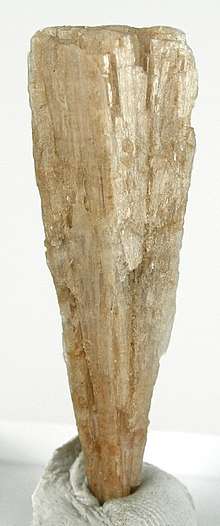Syngenite
Syngenite is an uncommon potassium calcium sulfate mineral with formula K2Ca(SO4)2·H2O. It forms as prismatic monoclinic crystals and as encrustations.
| Syngenite | |
|---|---|
 Tapering crystal of syngenite (size: 4.4 x 1.3 x 0.6 cm) | |
| General | |
| Category | Sulfate mineral |
| Formula (repeating unit) | K2Ca(SO4)2·H2O |
| Strunz classification | 7.CD.35 |
| Dana classification | 29.3.1.1 |
| Crystal system | Monoclinic |
| Crystal class | Prismatic (2/m) (same H-M symbol) |
| Space group | P21/m |
| Unit cell | a = 9.77 Å, b = 7.14 Å c = 6.25 Å; β = 104.01°; Z = 2 |
| Identification | |
| Color | Colorless, milky white to faintly yellow due to inclusions |
| Crystal habit | Tabular to prismatic crystals, lamellar aggregates and crystalline crusts |
| Twinning | Common on {101} contact twins |
| Cleavage | Perfect on {110} and {100}, distinct on {010} |
| Fracture | Conchoidal |
| Tenacity | Brittle |
| Mohs scale hardness | 2.5 |
| Luster | Vitreous |
| Streak | White |
| Diaphaneity | Transparent to translucent |
| Specific gravity | 2.579–2.603 |
| Optical properties | Biaxial (-), colorless (transmitted light) |
| Refractive index | nα = 1.501 nβ = 1.517 nγ = 1.518 |
| Birefringence | δ = 0.017 |
| 2V angle | Measured: 28° |
| Solubility | Partially dissolves in water |
| References | [1][2][3][4] |
Discovery and occurrence
It was first described in 1872 for an occurrence as druse on halite in the Kalusa Salt deposit, Ivanovo-Frankovsk Oblast', Ukraine.[2] The name is from Greek 'συγγενής' (related) due to its chemical similarity to polyhalite.[3][2]
It occurs in marine evaporite deposits as a diagenetic phase. It also forms as a volcanic sublimate, as vein fillings in geothermal fields and in caves where it is derived from bat guano. It occurs in association with halite and arcanite in salt deposits; and with biphosphammite, aphthitalite, monetite, whitlockite, uricite, brushite and gypsum in cave environments.[1]
It is also found in hardened cement which has relatively higher amount of potassium. [4]
Production
Syngenite can be artificially produced by the action of a potassium sulfate solution on gypsum.[5]
References
- Handbook of Mineralogy
- Syngenite on Mindat.org
- Syngenite data on Webmineral
- Atkins M, Glasser FP, Moron IP, Jack JJ, 1993. Thermodynamic modelling of blenede cemnts at elevated temperature(50-90C).
- Ennaciri, Yassine; Alaoui-Belghiti, Hanan El; Bettach, Mohammed (May 2019). "Comparative study of K2SO4 production by wet conversion from phosphogypsum and synthetic gypsum". Journal of Materials Research and Technology. doi:10.1016/j.jmrt.2019.02.013.

Bibliography
- Palache, P.; Berman H.; Frondel, C. (1960). "Dana's System of Mineralogy, Volume II: Halides, Nitrates, Borates, Carbonates, Sulfates, Phosphates, Arsenates, Tungstates, Molybdates, Etc. (Seventh Edition)" John Wiley and Sons, Inc., New York, pp. 442-444.